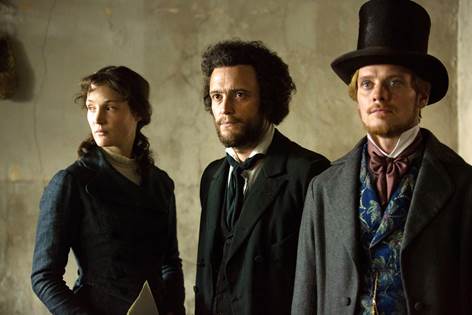The 19th century Industrial Revolution created great wealth?but also great poverty and oppression. As the great divide between the workers and the owners widened, some came to believe that society needed to change drastically. That is the setting for The Young Karl Marx from director Raoul Peck.
The film?s title may focus on Marx, but it is really about the friendship and collaboration between Marx (August Diehl) and Fredrich Engels (Stefan Konarske). The two young men were both passionate about wanting to change the world. Marx was something of an academic and writer looking at things from a more philosophical perspective. Engels, the son of a mill owner, knew firsthand the inequities of the world?although he was one of the privileged class. The film covers the years from 1843-47, and the publishing of The Communist Manifesto.
One of the interesting points is that these two founders of modern Communism both came out of the middle class of the time. Engels continued working at his father?s textile mill even while he fought to change the system that it represented. Marx faced the difficulty of many writers in trying to get his works published and at the same time support his growing family.
It is interesting that while many know who Karl Marx was, they may not really know his ideas, only how they were co-opted by various despots who saw in his writings the way to grab power. By focusing on Marx?s as a young man, the film is able to show us how the inequality of that time helped to form his ideas. The film serves as a primer for the development of Marxism. I was led to do a few Wikipedia searches for people and groups that play a part in this the story?including some Christian communist groups of the same time. The film seeks to present the early Marxist thought without the baggage it has picked up during the 20th century.
Many people of faith will automatically think that anything to do with Marx is anathema. Part of that may be his comment about religion being ?the opium of the masses? (a metaphor that can be interesting to unpack). Another issue is the way we often look at various Communist dictatorships that are built upon Marx?s foundation. However, we often overlook that Marx was reacting to oppression, exploitation, and injustice that were systemic to the European growing economy of that time. And because such disparities continue in many places in the world, Marx?s ideas continue to resonate with many people.
When Liberation Theology came to the fore in the 1970s many of those theologians were accused of being Communists because their thinking was very like Marx?albeit with a spiritual and biblical perspective added. This film may give people a glimpse at the things Christianity and other religions hold in common with Marx?s ideas.





